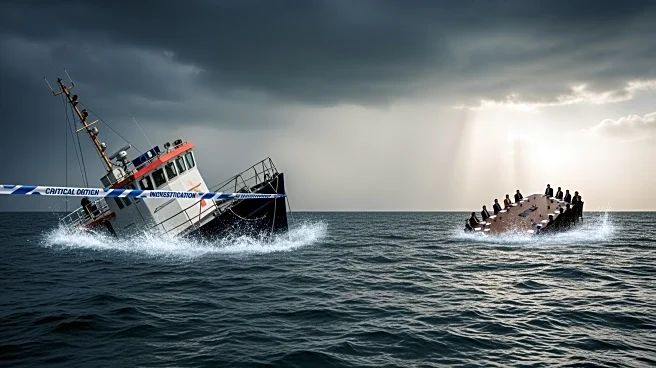What's Happening?
A comprehensive investigation by Regina Garcia Cano from The Associated Press has shed light on the identities and backgrounds of individuals killed in recent U.S. military strikes on alleged drug-smuggling boats off Venezuela's northeastern coast. Contrary
to the Trump administration's claims that these individuals were narco-terrorists or cartel leaders, the investigation revealed that most of the nine men were first-time or second-time crew members on these boats, earning approximately $500 per trip. The deceased included a fisherman, a bus driver, a former military cadet, and a local crime boss, among others. The investigation faced challenges due to the fear of reprisals from the Venezuelan government, which has intensified repression following last year's disputed presidential election.
Why It's Important?
This investigation is significant as it challenges the narrative presented by the U.S. government regarding the nature of the individuals targeted in the military strikes. The findings highlight the complexities of drug trafficking operations and the socio-economic conditions that drive individuals to participate in such activities. The revelation that many of the deceased were not high-level criminals but rather individuals struggling with poverty underscores the broader socio-economic issues in Venezuela. This could impact U.S. foreign policy and military strategy, prompting a reevaluation of how targets are identified and the consequences of military actions on local communities.
What's Next?
The investigation may lead to increased scrutiny of U.S. military operations in foreign territories, particularly regarding the accuracy of intelligence used to justify such actions. It could also prompt calls for greater transparency from both the U.S. and Venezuelan governments about the circumstances surrounding these strikes. Human rights organizations and international bodies might push for accountability and further investigations into the impact of these operations on local populations. Additionally, the Venezuelan government may face pressure to address the socio-economic conditions that contribute to drug trafficking.
Beyond the Headlines
The investigation highlights ethical concerns regarding military operations and the collateral damage inflicted on communities. It raises questions about the moral responsibility of governments to ensure accurate intelligence and minimize harm to civilians. The fear of reprisals from the Venezuelan government also points to broader issues of freedom of speech and human rights in the country. Long-term, this situation could influence international relations and the perception of U.S. military interventions abroad.















